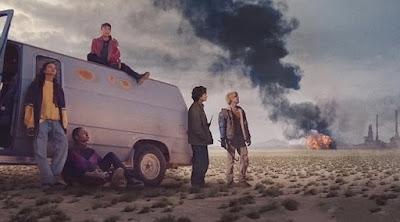Format: Streaming video from Hulu Plus on Fire!

I don’t tend to talk politics a lot on this blog because there’s no real reason to do so. It comes up now and then, and there are films I will refuse to watch because of their source, but other than that, this blog is mainly apolitical. It’s impossible to be apolitical when discussing How to Blow Up a Pipeline, though. This is a film where you will either throw in your sympathy wholeheartedly for the group of young people attempting to, well, blow up a pipeline, or you will do the opposite and want to see them thrown to the wolves. Just to make it clear at the top, I’m 100% on the side of the people blowing up the pipeline.
We’re going to get a main narrative of a group of people meeting up, creating explosives, and conspiring to destroy pieces of an oil pipeline in west Texas. Along with this, we’ll get a few side stories introducing us to the people involved. There are a number of intertwined stories here. Xochitl (Ariela Barer) is frustrated with the slow speed at which activism moves and argues for more direct action. This catches the attention of Shawn (Marcus Scribner), who is in the same environmental campus group. Xochitl’s best friend is Theo (Sasha Lane), who is dying of cancer most likely contracted because of oil spills and pollution. Theo is in a relationship with Alisha (Jayme Lawson), who objects to this kind of action. Meanwhile, in the course of making a documentary, Shawn meets Dwayne (Jake Weary), a rancher who has lost some of his family’s land to the pipeline thanks to eminent domain statutes. We’re also going to meet Michael (Forrest Goodluck), a native American who has learned to make explosives, and Logan and Rowan (Lukas Gage and Kristine Froseth), a hippy-like pair who have been recruited for a reason that isn’t immediately apparent.
The goal is to target a pipeline in Texas. This will accomplish a number of goals for our group of protagonists. First, the disruption of oil distribution will spike gas and oil prices around the country. Second, doing this carefully, they will avoid killing anyone and cause minimal environmental damage. This is clearly definable as an act of terrorism, but our main players are attempting to be as ethical as possible in doing so.
This is the whole film—our group shows up to a remote location that was formerly on Dwayne’s land. They plan, prepare their materials, and carry out the destruction of the pipeline, which includes turning off the oil going through the pipeline to prevent spilling, and damaging the pipeline only at the places where it is at its highest point, meaning any oil in the pipe will drain back rather than spilling out.
There are a lot of things that work beautifully in How to Blow Up a Pipeline. One of the major things is that all of these people look completely normal. These are not known actors in general. They all look like people you would see in line at the grocery store. It makes the film feel much more real that these aren’t people who have a famous role in the past or a catchphrase they are attached to.
It also works that these are characters who genuinely feel like real people. In the real world, if these people existed, a lot of them wouldn’t like each other. Dwayne is clearly the sort of guy who probably blames his problems on the “damn liberals” despite it being conservative policies (more than likely) that led him to his current problems. Michael is quiet and stern and seems to not really care about any of the people around him. In the world of many of the characters, this is about building something better; for Michael it’s about destroying the system without caring about what comes behind. The best indication of this is when Dwayne meets the rest of the conspirators and offers a cooler filled with fresh deer meat, something that is immediately responded to with “I’m vegan,” and “I’m vegetarian.”
I’m not going to pull the punch here: How to Blow Up a Pipeline is a polemic about climate change and about carbon emissions. The problem that people are going to have with this is a political one rather than a survival one, though. The people who aren’t going to like this movie are the ones who think climate change isn’t real, isn’t serious, or isn’t something that we’ve done. And that’s really it, and I realize that this is a bold statement. If someone doesn’t like this film, there’s a +90% chance that it’s for political reasons.
Why? Because this movie is smart, well-made, and compelling. It’s also not what you expect. You likely go into this thinking that it will feel like a propaganda film, or that it’s going to play like a documentary. In reality, this is a heist movie. The difference is that the reward isn’t money, but destruction.
Why to watch How to Blow Up a Pipeline: This is soon our reality.
Why not to watch: This is soon our reality.
